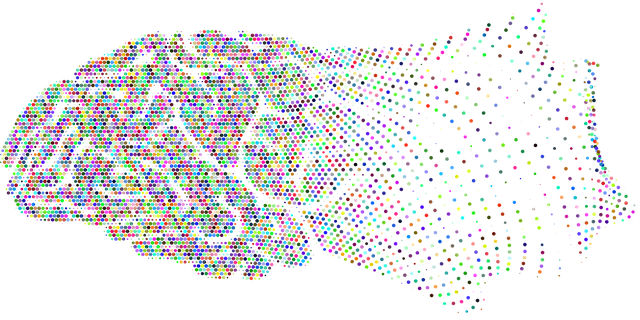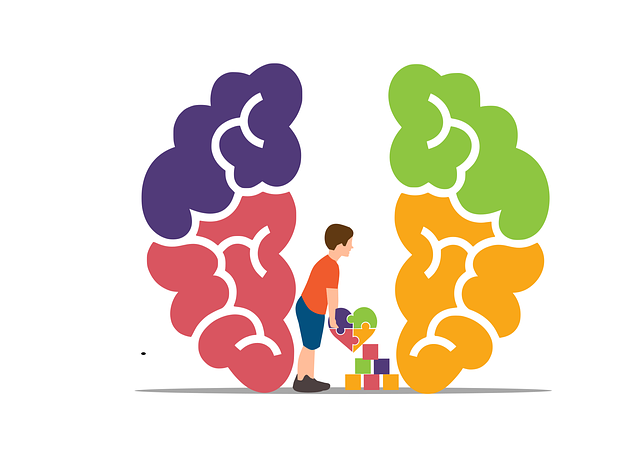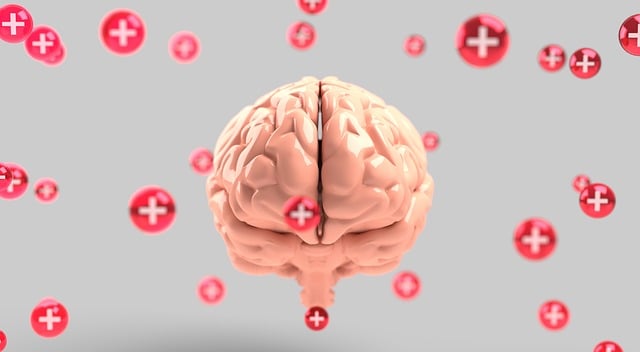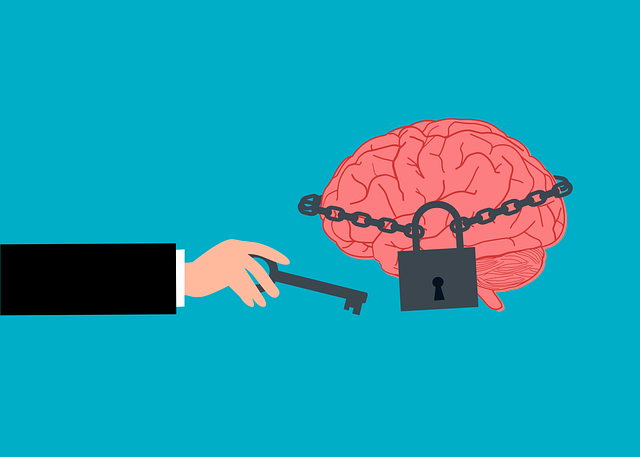Emotional intelligence (EI) is a vital skill set for stress management, enabling individuals to understand and control their emotions while interpreting and influencing others'. Strong EI reduces impulsive behaviors and mental health issues like anxiety or depression. Therapy for Stress Management incorporates EI development through techniques enhancing self-care routines and mitigating stressor events, contributing to Mental Illness Stigma Reduction Efforts and improved well-being. Self-awareness, crucial for EI, helps uncover emotional triggers leading to better decision-making, healthier relationships, and personal growth. Empathy, another key component of EI, fosters understanding in crisis interventions and trauma support services, enhancing mental wellness. Effective communication skills, emphasized in therapy for stress management, de-escalate stressful situations, build resilience, and create positive environments, ultimately maintaining a balanced state of mind.
Emotional intelligence (EQ) is a powerful tool in navigating life’s challenges, particularly when it comes to managing stress. This article explores the building blocks of EQ and its profound impact on our mental well-being. We’ll delve into understanding emotional triggers, cultivating self-awareness, empathy, and effective communication skills. By identifying patterns and mastering these aspects, you can significantly improve your stress management techniques, offering a holistic approach for those seeking therapy for stress relief.
- Understanding Emotional Intelligence and Its Impact on Stress
- Identifying Your Emotional Triggers and Patterns
- Developing Self-Awareness: The Cornerstone of EQ
- Enhancing Empathy: Walking in Another's Shoes
- Mastering Communication Skills for Better Stress Management
Understanding Emotional Intelligence and Its Impact on Stress

Emotional intelligence (EI) refers to an individual’s ability to recognize, understand, and manage their own emotions, as well as recognize, interpret, and influence the emotions of others. This skill set goes beyond mere empathy; it involves using emotional awareness to guide thoughts and actions, fostering effective communication and positive relationships.
A strong EI can significantly impact stress management. Individuals with high emotional intelligence are better equipped to handle challenging situations as they can identify and process their feelings constructively, reducing the likelihood of impulsive or detrimental behaviors. This is particularly beneficial in navigating life’s stressors, avoiding them escalating into overwhelming mental health issues like anxiety or depression. Therapy for Stress Management often incorporates EI development, focusing on techniques to enhance self-care routine and mitigate the impact of stressor events, thereby contributing to Mental Illness Stigma Reduction Efforts and overall well-being.
Identifying Your Emotional Triggers and Patterns

Identifying your emotional triggers and patterns is a powerful step in building emotional intelligence and managing stress. Many people operate on autopilot, reacting to situations without fully understanding their underlying emotions. Through introspection and possibly therapy for stress management, individuals can uncover recurring feelings and thoughts that set off specific behaviors or reactions. This awareness allows for better coping mechanisms and more thoughtful responses.
By recognizing these triggers—whether they’re related to past experiences, certain people, or particular environments—you can develop empathy building strategies tailored to your needs. For healthcare providers, burnout prevention strategies often involve understanding their emotional patterns in the face of challenging situations. This self-awareness not only benefits individual well-being but also contributes to efforts towards mental illness stigma reduction by fostering more compassionate interactions with patients and colleagues.
Developing Self-Awareness: The Cornerstone of EQ

Developing self-awareness is the cornerstone of emotional intelligence (EQ). It involves recognizing and understanding your emotions, strengths, weaknesses, and how they impact your thoughts and behaviors. Through introspection and reflection, individuals can gain insights into their emotional triggers, patterns, and responses. This awareness enables better decision-making, fosters healthy relationships, and promotes personal growth. By acknowledging and managing one’s emotions effectively, people can enhance their overall well-being and navigate life’s challenges more adeptly.
Self-awareness is a crucial component in therapy for stress management, as it helps individuals identify and address underlying emotional issues that may contribute to anxiety or depression. Mindfulness meditation has been shown to be an effective tool in cultivating self-awareness, allowing people to stay present with their emotions without judgment. This practice supports burnout prevention by promoting a deeper connection with oneself and increasing resilience to stress. Additionally, enhancing self-awareness can serve as a powerful strategy for depression prevention, empowering individuals to recognize early warning signs and implement coping mechanisms before symptoms escalate.
Enhancing Empathy: Walking in Another's Shoes

Empathy is a cornerstone of emotional intelligence, and cultivating it can significantly enhance our relationships and mental wellness. To develop empathy, one must learn to walk in another’s shoes, understanding their feelings, perspectives, and experiences as if they were your own. This involves active listening—really paying attention to what the other person is saying and feeling, beyond just hearing the words. It also requires putting aside personal biases and judgments to create a genuine connection with others.
In today’s fast-paced world, where stress management through therapy for stress management has become increasingly crucial, empathy plays a pivotal role in crisis intervention guidance and trauma support services. Mental wellness coaching programs focused on developing emotional intelligence can help individuals master this skill, leading to more fulfilling relationships and improved mental health. By fostering empathy, we create environments that are supportive, understanding, and nurturing—essential elements for maintaining good mental health and overall well-being.
Mastering Communication Skills for Better Stress Management

Mastering effective communication skills is a powerful tool for managing stress and promoting emotional well-being. In today’s fast-paced world, we often face challenging situations that can trigger stress, anxiety, or even anger. Learning to express ourselves clearly and assertively allows us to navigate these moments with greater ease. Therapy for Stress Management often emphasizes the importance of communication as a key component in reducing stress levels. By understanding conflict resolution techniques, individuals can transform potentially explosive interactions into opportunities for growth and understanding.
Emotional intelligence involves recognizing and managing our emotions, both in ourselves and others. This includes active listening, empathy, and the ability to provide constructive feedback. Practicing these skills enables us to de-escalate stressful situations, foster healthier relationships, and create a more positive environment at work or home. Incorporating emotional well-being promotion techniques into daily life can significantly impact our overall stress management abilities, helping us build resilience and maintain a balanced state of mind even in the face of challenging circumstances.
Emotional intelligence (EQ) is a powerful tool for managing stress and cultivating healthier relationships. By understanding and regulating emotions, we can break free from negative patterns. Through self-awareness, empathy, and effective communication, individuals can navigate life’s challenges with greater resilience. Incorporating these strategies into daily routines can significantly improve mental well-being, making it easier to seek therapy for stress management when needed. Building EQ is an ongoing journey that fosters personal growth and enhances our ability to connect with others.














